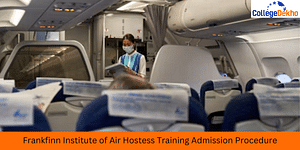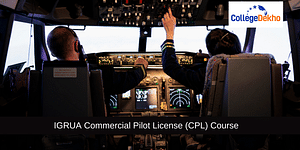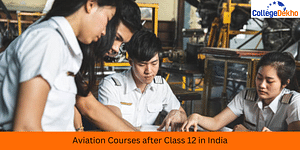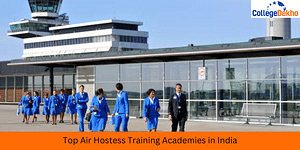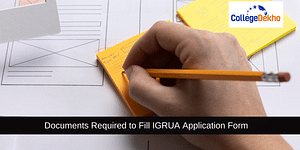Pilot Training Syllabus & Subjects 2024
Pilot Training course syllabus and subjects include topics related to Cargo Handling, Airline Operation and Scheduling, Aviation Law, etc. Candidates are instructed, tested, and evaluated in aviation meteorology, air navigation, and air regulations at the Student and Private Pilot Licence levels. They learn the technical part and flight planning at the Commercial Pilot Licence level.
Pilot Training Syllabus & Subjects Overview
The pilot training course syllabus is the perfect blend of theoretical and practical subjects to shape students into a skilled pilot. The course curriculum includes two types of training namely flying training and ground training. Flying training is the practical training which includes flying hours designated differently for each license. While ground training includes the theoretical aspects of flying. The pilot training course subjects comprise topics from the fundamentals of flight to emergency procedures, flight planning process and more.
The syllabus structure for diploma, certificate and UG-level courses is distinct. The UG pilot training course syllabus includes flight physiology, aviation meteorology, air regulation and navigation and others. The diploma course syllabus and subjects comprise air ticketing and reservations, basics of airport operations, passenger handling & check-in procedures and more related aspects. To gain in-depth knowledge of this discipline students must refer to the best books available including To Be an Airline Pilot, How to Become A Pilot, Adventure of Becoming an Airline Pilot and various others. Keep reading to know more about the syllabus, subjects, best books and more related information.
Table of Contents
- Pilot Training Syllabus & Subjects Overview
- Pilot Training Year Wise Syllabus
- Pilot Training Subjects
- Pilot Training Common Subjects for All Semesters
- Pilot Training Course: Flight Training Hours
- Specializations offered in Pilot Training
- Syllabus for Pilot Training Distance Programs
- Pilot Training Entrance Exam Syllabus
- Pilot Training Important Books
- Pilot Training Course Structure
- FAQs about Pilot Training Syllabus
Pilot Training Year Wise Syllabus
The pilot training course syllabus structure will vary depending on the type of course and the institute. However, students who are going to apply for the pilot training course can check out the generic syllabus pattern given below.
Pilot Training Syllabus for UG Courses
The pilot training course syllabus for the UG level such as BA and BSc includes different aspects of flight and aviation such as solo flights, dual flights, airframes and more subjects.
BBA in Airport Management
The syllabus for BBA in Airport Management may vary from institution to institution. Below mentioned is the generic syllabus structure for this course:
| Front Office Operation | Airport Operations |
|---|---|
| Travel management | Basics of Aviation |
| Management Process Accounting | Airport Security Management |
| Aviation law | Aviation Marketing |
| Cargo Transportation | Crew Management |
| Airlines Business Management | Air Traffic Rules Regulations |
BSc Aviation
Check out this UG pilot training course syllabus below:
| Air regulations | Navigation |
|---|---|
| Meteorology | Aircraft and Engines |
Pilot Training Syllabus for Diploma Courses
The diploma-level pilot training course syllabus is different from the UG-level structure. This short-term course of 6 to 12 months provides students with the base knowledge of the course. Find the syllabus below.
Diploma in Airfare and Ticketing Management
The pilot training course syllabus at the diploma level can be found below:
| Air travel requirements | Air-ticketing and reservations |
|---|---|
| Airline and Airport codes | Ticketing policies and procedure |
| Fare construction rules and policy | Cancellation and refund policy |
Diploma in Ground Staff & Cabin Crew Training
Check out the syllabus for this course below:
| Airport Division | Aviation Fundamentals |
|---|---|
| Check-in Procedures | Baggage handling |
| Passenger handling | Customer service |
Pilot Training Syllabus for Certificate Courses
The certificate pilot training course syllabus is designed to provide the base knowledge along with advanced in a short period. It will also differ based on the type of certificate course and the institute.
Commercial Pilot Training
Check out the syllabus for CPL below:
| Air Navigation | Flight Planning and Monitoring |
|---|---|
| Radio Navigation | Aviation Meteorology |
| Air Regulations | Aircraft and Engines |
| Principles of Flight | Human Performance |
Private Pilot Training
Check out the private pilot training syllabus below:
| Fundamentals of Flight | Traffic Patterns |
|---|---|
| Discovering Aviation | Flight Operations |
| Emergency Procedures | The Flight Planning Process |
| Radio Communications, Navigation, Systems/Facilities, and Radar Services | Recovery from Unusual Flight Attitudes |
Pilot Training Subjects
The pilot training course subjects are different based on the course, so students must check out the course curriculum before applying for any course type. The subjects in this training course are based on both practical and theoretical concepts to train students to live their dream careers. Check out the generic pilot training course subjects below:
| Subject Name | Description |
|---|---|
| Air Law | The Air Law subject will make students aware of the various rules of aviation which need to be followed whether on a plane or airport. These rules are defined by the different regulatory bodies. |
| Mass and Balance | To understand the performance and stability of aircraft under different operating conditions, understanding the mass and balance is vital. Before starting any flight, knowing the mass of an aircraft and the location of the centre of gravity is very important. |
| Flight Planning and Monitoring | Flight planning includes the process of framing a flight plan to describe an aircraft flight. It includes preflight preparation, airway routines, decision point procedure and other aspects. Flight monitoring defines the observation and interpretation of the flight path data, automation modes, etc. |
| Meteorology | Meteorology is the study of the atmosphere which includes weather processes and forecasting. It comprises both the climate and weather. |
| General Navigation | This subject includes topics such as the planning process, recording, and controlling the movement of an aircraft. |
Pilot Training Common Subjects for All Semesters
Certain subjects are common for all semesters in the pilot training course syllabus. Check out them below:
| Meteorology | General Navigation |
|---|---|
| Radio Navigation | Operational Procedures |
| Communications | Human Factors |
| Instrumentation | Flight Planning and Monitoring |
| Flight Physiology | Aircraft & Engines |
Pilot Training Course: Flight Training Hours
Students applying for pilot training courses need to fulfil a certain number of flight training hours to get their license. Check out the hours for different licenses below:
Commercial Pilot License
For CPL, students need to fulfil 200 hours of practical flight experience. It is divided into ground training, simulator training, and flying training. The air training includes:
- 100 hours of Pilot-in-Command training, where students control the aircraft.
- 20 hours of flying experience over long-distance to learn navigation skills.
- 10 hours of flying experience using only aircraft instruments for navigation.
- 5 hours of flying during night time to learn night-time navigation and procedures.
Private Pilot License
PPL requires students to have 40 hours of flying experience. It includes day and night flying, and cross-country followed by other training requirements such as various maneuvers.
Specializations offered in Pilot Training
Candidates willing to pursue pilot training courses are encouraged to choose various specializations that will help them specialize in the particular field. Therefore candidates can choose from several specializations as mentioned below.
Professional Pilot Specializations
The core Professional Pilot Courses have been listed in the pointers below.
- Private Pilot Flight Laboratory I
- Private Pilot Flight Laboratory II
- Private Pilot Flight Laboratory III
- Introduction to Aviation
- Principles of Flight I
- Principles of Flight II
- Instrument Pilot Flight Lab I
- Instrument Pilot Flight Lab II
- Instrument Pilot Flight Lab III
- Meteorology for Pilots
- Aircraft Systems I
- Outdoor Survival for Pilots
- Instrument Flight I
- Instrument Flight II
- Commercial Pilot Flight Lab I
- Commercial Pilot Flight Lab II
- Commercial Pilot Flight Lab III
- Aviation Weather Services
- Applied Aerodynamics for Pilots
- Human Factors in Flight
- Multi Engine Principles
- Commercial Pilot
- Aviation Law
- Aviation Career Planning and Professionalism
- Aviation Safety Management
- Threat and Error Management in Aviation
- Professional Pilot Capstone
Flight Officer Specialization
The core flight officer courses have been listed in the pointers below.
- Aircraft Systems – Turboprop
- Air Transportation
- Air Carrier Operations
- Multi Engine Flight Laboratory
- Certified Flight Instructor Laboratory
- Crew Resource Management
- Aircraft Systems - Turbojet
- Multi Engine FTD - Baron G58
- Fundamentals of Flight Instruction
- Turbojet Operations
- Turbojet FTD - CRJ-200
- Department approved electives
- (any AVM or AVP course not used in required courses)
Quick Link: How to Become a Commercial Pilot in India?
Syllabus for Pilot Training Distance Programs
Pilot Training courses are not only available in the offline course but candidates can also pursue the Pilot Training course through distance learning modes. It is not possible for all the candidates to pursue the Pilot Training courses through offline mode. This is so because not all the candidates are able to meet up the high course fees. Therefore for the sake of these candidates, there are institutes that are offering pilot training courses. These institutes aim at providing the course at the top class level. Some of these top institutes include:
- Red Cap Aviation, Palayamkottai
- Zabeel International Institute of Management and Technology, Ernakulam
- Lily Beach Resort & Spa
- The WB National University of Juridical Sciences (NUJS), Kolkata
- Flying Birds Aviation, Academy for Pilot Training and Distance Learning, Ahmedabad
Also read: How to Become a Pilot after 12th?
Pilot Training Entrance Exam Syllabus
Candidates who are willing to pursue pilot training have to appear for entrance examinations that include AFCAT, IGRUA, AME CET, TS EAMCET, JEE Main, etc.
Pilot Training Syllabus- General Awareness
The Pilot Training subjects for the general awareness syllabus have been listed in the pointers below.
- History
- Sports
- Geography
- Art and Culture
- Current Affairs
- Politics
- Civics
- Environment
- Defense
- Basic Science
Pilot Training Syllabus- English
The Pilot Training subjects for the English syllabus have been listed in the pointers below.
- Comprehension
- Basic Grammar
- Fill in the blanks by choosing the appropriate word
- Tenses
- Error Detection
- Sentence Completion
- Synonyms and Antonyms
- Testing of Vocabulary
- One Word Substitution
Pilot Training Syllabus- Numerical Ability
The Pilot Training subjects for the Numerical Ability syllabus have been listed in the pointers below.
- Decimal and Fraction
- Simple Interest & Compound Interest
- Time & Distance (Trains/Boats & Streams)
- Percentage
- Ratio & Proportion
- Time and Work
- Average
- Profit & Loss
Pilot Training Syllabus- Reasoning and Military Aptitude Test
The Pilot Training subjects for the Reasoning and Military Aptitude Test syllabus have been listed in the pointers below.
- Odd One Out
- Analogy
- Venn Diagram
- Pattern Completion
- Dot Situation Analysis
- Blood Relation
- Missing Figures
- Figure Classification
- Coding and Decoding
- Spotting the Embedded Figures
- Sequencing
Quick Link: BBA in Aviation
Pilot Training Important Books
Candidates who are aiming to pursue pilot training courses to have to refer to the best textbooks from the authorized sources. Therefore it is always advised to them to refer to the text books that are written by authorized authors and that cover the full syllabus of the course.
The table below highlights the important textbooks along with the authors' names.
| Books | Authors |
|---|---|
| How to Become A Pilot: The Step-by-Step Guide to Flying | Federal Aviation Administration |
| Adventure of Becoming an Airline Pilot | George Flavell |
| Your Pilot’s License, Eighth Edition | Jerry Eichenberger |
| To Be an Airline Pilot | Andrew Cook |
| Airplane Flying Handbook | David Soucie |
Pilot Training Course Structure
The course structure of Pilot Training includes practical knowledge in the field as well as theory classes that are required for shaping the candidates on the basis of the requirements. This will include on the field training given to the candidates. The curriculum of pilot training is designed to form a disciplined and confident pilot who can fly specific aircraft for the either private or commercial sector. Therefore candidates are also provided with licenses based on the domains they are choosing to work on in the future. A pilot can train for the following license.
- Private License
- Commercial License
- Instrument Rating
- Commercial Single Engine
- Commercial Multi-Engine
- Certified Flight Instructor and Flight Instructor Instrument
The Pilot Training Course Structure has been listed in the pointers below.
- Fundamentals of flight
- Check ride Preparation
- Soft/short field takeoff & landings
- Pilotage and dead reckoning
- Traffic patterns
- Recovery from unusual flight attitudes
- Discovering aviation
- Radio communications, navigation, systems/facilities, & radar services
- Aerodynamic principles
- The power plant and related systems
- Flight operations
- Emergency procedures
- The flight planning process
- Take off & landings
Quick Link: Top Aviation Colleges in India 2023
FAQs about Pilot Training Syllabus
Which colleges offer the best Pilot Training course curriculum?
The list of colleges that offer the best Pilot Training course curriculum includes VELS Institute of Science/ Technology and Advanced Studies, The Bombay Flying Club, Silver Oak University, PTC Aviation Academy (Chennai), National Flying Training Institute (CAE), Indira Gandhi Rashtriya Uran Akademi, Indira Gandhi Institute of Aeronautics (IGIA), Adventure Flight Education Private Limited (Hyderabad), Academy of Carver Aviation Pvt Ltd, etc.
What is the Pilot Training course syllabus?
The Pilot Training course syllabus includes topics such as Understanding Aviation Business, Introduction to Aviation Industry, Cargo Handling, Aviation Safety Management and Accident Investigations, Aviation Law, Airport Functions of Airline, Airline Operation and Scheduling, and Airline Marketing Management.
What is the Pilot Training course curriculum?
The Pilot Training course curriculum blends theory and hands-on instruction to create proficient pilots and blends classroom instruction with real-world application. Ground training and flight training are the two training modalities included in the programme. Studying the theoretical components of flying is called ground training. The goal of the pilot training programme is to produce well-behaved, self-assured pilots who can operate particular aircraft in the private or commercial sectors.
What are the Pilot Training course subjects?
The Pilot Training course subjects at an undergraduate level include topics such as Stability and Control, Solo Flight and Dual Flights, Power-off stalls, Normal & Cross Wind take-off, Manoeuvring, Go-around Factors, Forces acting on the aeroplane, Flight Training Process, Flight Physiology, Eight-on Pylons, Basic Flight instruments, Approach and Landing, Airframe, Air regulation and navigation, etc.
What is the Pilot Training course syllabus for entrance exams?
The Pilot Training course syllabus for entrance exams will typically cover questions on topics such as meteorology, aircraft systems, air navigation, and regulations, etc. Instructional materials on flight planning, aircraft weight and balance, performance, and operations will also be included in the syllabus of an airline pilot preparation course.
Popular Courses
- Courses
- Pilot Training
- Syllabus

